The Packers’ history is arguably the richest and certainly the longest-lasting, considering the Green Bay franchise predates the NFL’s inaugural season of 1920.
This truth made Aaron Rodgers’s statement on March 15 on The Pat McAfee Show all the more surprising, when he asserted his opinion of perhaps being the greatest player to ever wear a Packers uniform.
Naturally, this prompted the thought of whether Rodgers really tops that list. It’s an illustrious one, loaded with legends who contributed to 13 championships, including four Super Bowls.
And for many of the recent generations, the conversation starts with the seminal question: Rodgers or Brett Favre? Ask those around them—and we did—and it’s impossible to get a straight answer.
Perhaps that’s because this is the football equivalent of asking a Wisconsinite to choose between cheese curds and beer. Favre was jettisoned in 2008 to the Jets, leaving for the same destination Rodgers appears headed.
For former Packers vice president Andrew Brandt, who joined the club in 1999 and also contributes to The MMQB as our business of football columnist, the situations are strikingly similar.
“It’s eerie,” Brandt says. “The déjà vu is overwhelming. Eighteen years ago we took this first-round quarterback, and everybody hated that we took him. Brett was upset, Brett’s agent was upset, the fans were upset, the media was upset, and Aaron couldn’t have been too happy, coming to a place that was freezing and never was going to play.”
Brandt remembered the following three years as a weekly summit with Favre’s camp telling the organization how difficult it was coming to work. During offseasons receivers raved to the Packers’ brass about Rodgers.
Finally, after three years of Rodgers on the bench, Green Bay traded Favre. Now, after three years of Jordan Love waiting, he’s going to take his turn, with Rodgers apparently headed east.
Still, despite all the current tension, Brandt finds one significant difference from Favre’s departure: the level of ugliness.
“It’s less,” Brandt says. “Brett retired and came back expecting to have his job back. It was training camp. Brett came to practice as a backup. People are suggesting the Jets have some leverage because Aaron is going to show up at training camp if the deal’s not done. There’s no way. But that happened. … I’m kind of away from this, but what I can tell from vast Packers Nation is they’re kind of O.K. with this. Packers fans are kind of O.K. moving on from Aaron, which is an extraordinary statement. When we went through this with Brett, there were 95% who [hated it], like, How could you get rid of Brett Favre for this unknown kid?”
So where do Rodgers and Favre rank? Who will have the greater legacy?
Since Rodgers said it was “debatable” whether he was the greatest Packer during his interview with Pat McAfee, let’s debate. Here are our top 10 players in Green Bay’s history, who each made an All-Decade Team and who all have busts in Canton, where Rodgers will join them five years after his playing career is over.
10
Reggie White, DE (1993–98)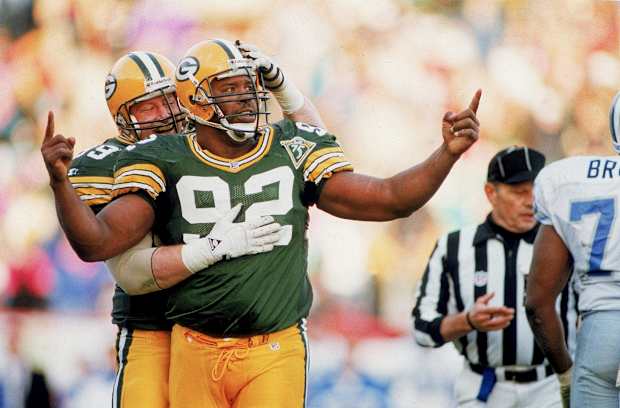
John Beiver/Sports Illustrated
If we counted all of White’s record-setting career, he’d be much higher. But only his time with the Packers counts, and yet he still posted six Pro Bowls nods, was a two-time first-team All-Pro and had three sacks in Green Bay’s Super Bowl XXXI victory over the Patriots.
“Probably top 10, if you compare what he did with Willie Davis,” says Cliff Christl, a longtime Wisconsin sportswriter and the official Packers historian since 2014. “White was a great player with an edge in longevity and a great pass rusher. I think most personnel people and players in the league [would say] his best years were in Philadelphia. But what he could do here was make big plays in big moments.”
White totaled 68.5 sacks in six seasons with Green Bay and won Defensive Player of the Year in 1998. After his playing days, White tried to get into the business side of football but quickly realized sacking quarterbacks was the better side of the business.
“He retired the day I started,” Brandt says. “I heard all the stories. The Reverend. The impact he had there, and he came back a lot. He told me one year, ‘Andrew, I’m going to be an agent. I’m going to work with this agent and I think I can influence these kids. I think I can lead them right.’ I said, ‘Reggie, you don’t want to do that. It’s a brutal business, and I hate to say it, but these guys, they’re not going to care who you are.’
“… I remember the day vividly. He was supposed to meet a first-round defensive tackle, John Henderson, who went to his old school, Tennessee. And John Henderson blew him off. And he called me that night and said, ‘I’m out.’”
9
Bart Starr, QB (1956–71)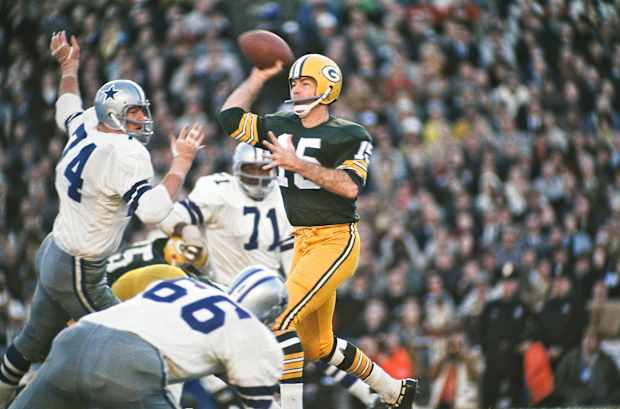
Neil Leifer/Sports Illustrated
Starr holds a special place in Green Bay. Originally an afterthought as a 17th-round draft pick in 1956, Starr became the starting quarterback in ’59 under coach Vince Lombardi and proceeded to lead the Packers to five NFL titles. Starr was also a four-time first-team All-Pro and won MVP honors in ’66.
“The ’61 and ’62 championships, he was kind of along for the ride,” Christl says. “Then in ’65, he struggled again, but ’66 he was MVP of the league and ’67, those last two years, he won the big games. He cemented Lombardi’s legacy. Many people who knew Lombardi have told me his goal was to win three straight championships, and he always questioned whether Starr could be the guy. He twice tried to trade him straight up for [Dallas quarterback] Don Meredith, and the Cowboys turned him down.”
While Starr wasn’t prolific, he led the NFL in completion percentage four times and posted a 10–1 postseason record. He also forged an iconic 68-yard drive to beat the Cowboys in the final seconds of the Ice Bowl on New Year’s Eve 1967.
“He was a legend that came back a lot, he and his wife, Cherry,” Brandt says. “There are few people who have that status and the humility that goes along with it. He was genuinely interested in people when he walked around the office. You’re talking about a superstar. He was a gem. Everybody up there feels that way.”
8
Willie Davis, DE (1960–69)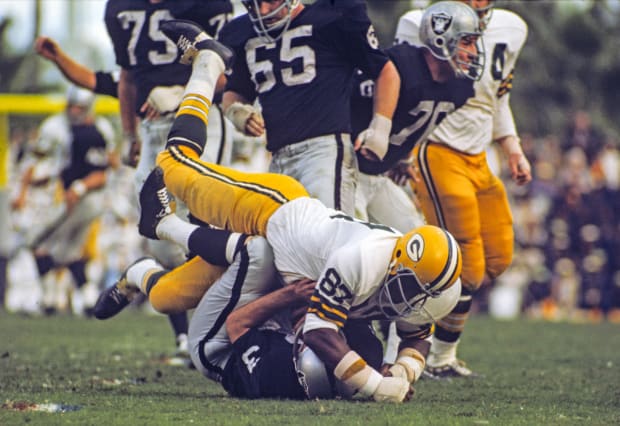
Neil Leifer/Sports Illustrated
Davis is one of the most underrated defensive ends in league history. A draft pick of the Browns in 1956, he didn’t join Cleveland until ’58 because of Army service. Davis was eventually traded to Green Bay before the ’60 season. With Davis, the Packers reeled off five championships while he unofficially recorded 99.5 sacks, which didn’t become an official NFL stat until ’82.
“He was a great pass rusher,” Christl says. “Played left defensive end when most teams played their best pass rusher on the best left side, unlike today. I believe he was the first African American captain of the Packers. I believe he may have been the first in the NFL. His greatest game was the 1961 NFL championship. In that game, the Giants went to three offensive tackles, trying to find someone who could block him.”
All told, Davis ended up going to five Pro Bowls and being named to a first-team All-Pro on five occasions. Davis also forced the Million-Dollar Fumble against the Colts, stripping quarterback Johnny Unitas in 1966 to secure the Western Conference title.
7
Paul Hornung, RB (1957–66)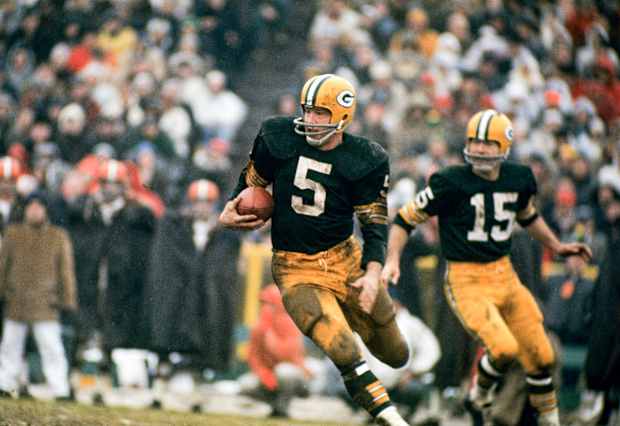
Neil Leifer/Sports Illustrated
Hornung doesn’t stack up statistically to some other great Packers. He never rushed for 1,000 yards and wasn’t on all five title teams. Yet many of his teammates—and coach Vince Lombardi—believed he was the most important player of the ’60s dynasty.
“Vince Lombardi said Paul Hornung was his greatest player ever,” Christl says. “I kind of get a charge out of these stat geeks who don’t know our history. … I buy into the fact that I don’t know more than Vince Lombardi. If Lombardi said he was his greatest player, and he expressed those feelings numerous times, I would assume Paul Hornung was his greatest player. Most Packers players from that era would tell you that, from Herb Adderley to Jerry Kramer.”
A two-time first-team All-Pro and Pro Bowler, Hornung won the 1961 MVP award despite not practicing due to his military commitments that year. He scored 10 touchdowns while accounting for 86 additional points as the kicker.
6
Herb Adderley, CB (1961–69)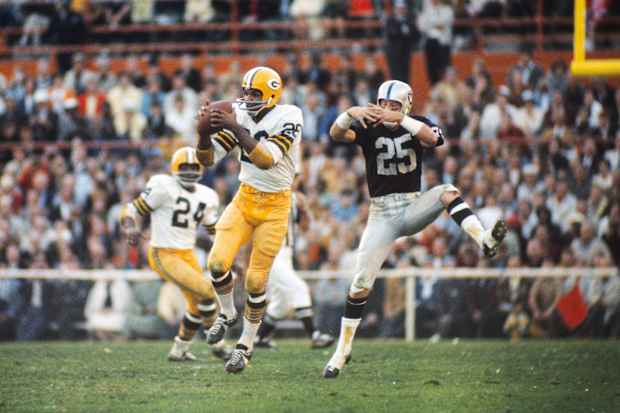
Neil Leifer/Sports Illustrated
Adderley had a storied career, winning five championships in Green Bay before finishing his career with another Super Bowl victory as a member of the Cowboys.
“He was the prototypical cornerback then and, if he played today, he’d still be the prototypical cornerback,” Christl says. “He was a shutdown corner before anybody used that term. Great speed. All you need to do is look at his kick-return stats. Physical, punishing tackler. Punishing in coverage. You could make a strong argument he was the best of the Packers’ players in Lombardi’s three-peat run at playing his position.”
With the Packers, the star cornerback was a five-time first-team All-Pro while reaching five Pro Bowls as well. His lasting moment came in Super Bowl II, when he intercepted a Daryle Lamonica pass before returning it 60 yards for a fourth-quarter touchdown.
5
Willie Wood, S (1960–71)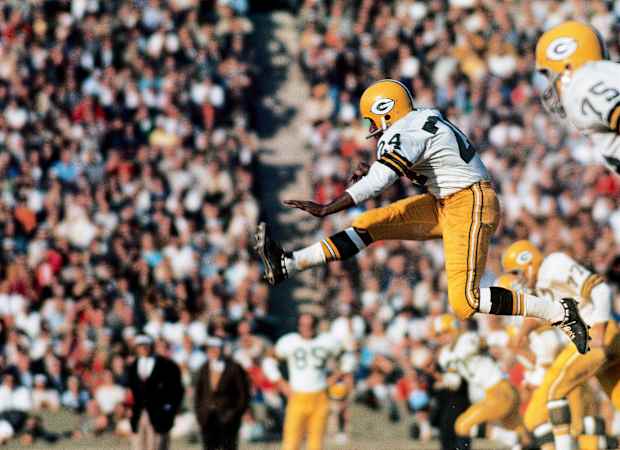
Neil Leifer/Sports Illustrated
Wood was the best safety of his era alongside Cardinals star Larry Wilson. In his 12-year career in Green Bay, Wood went to eight Pro Bowls over a nine-year period, while also being named first-team All-Pro four times.
“Best tackler in the game; I think Lombardi said that when he played,” Christl says. “Another big-play guy, made the big play in Super Bowl I. And a punishing tackler. Mike Ditka once said … he was the hardest hitter he ever played against.”
Wood was one of the famed ’60s Packers, who won all five of their titles. His interception in Super Bowl I against Len Dawson, and the Chiefs turned the game from a contest into a rout early in the second half.
4
Forrest Gregg, OT (1956–70)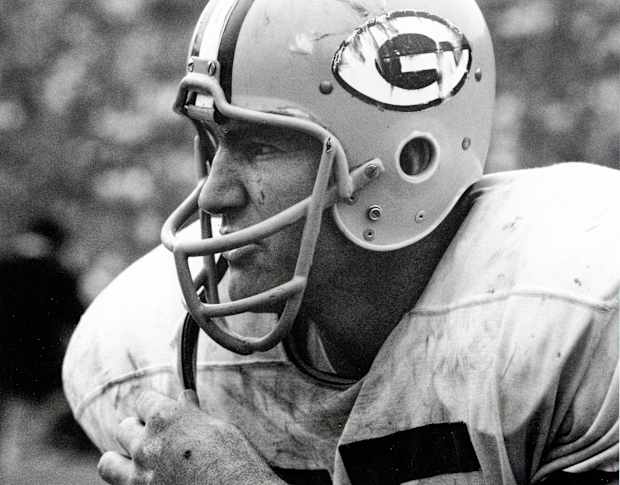
David Boss/USA TODAY Sports
Gregg is arguably the greatest right tackle in NFL history. His versatility can’t be overlooked, as he earned seven first-team All-Pro honors, six at tackle, and then one after kicking inside to right guard in 1965 when injuries created the need.
“Great technician, and as John Roach told me once, the offensive line was the crown jewel of those early championship teams as a unit,” Christl says. “Gregg was considered the best of that group. I think that was a bottle high for him. Offensive tackle has a hard time impacting games. Very durable, set the record for consecutive games. No question, a great player.”
Gregg played 188 consecutive games, went to nine Pro Bowls and won five NFL championships. The native Texan has a strong argument as the best Packer ever.
3
Brett Favre, QB (1992–2007)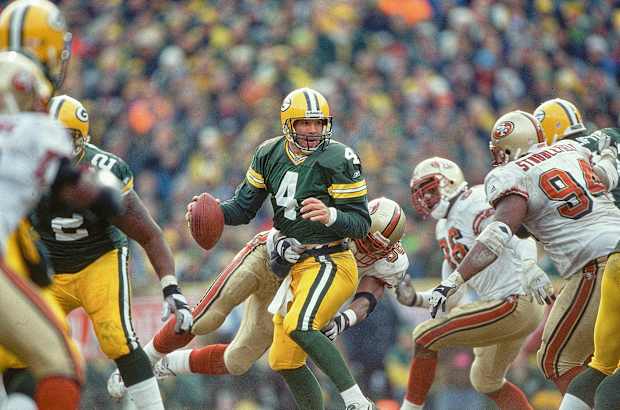
Damian Strohmeyer/Sports Illustrated
Favre came to Green Bay by way of a trade with the Falcons, and the second-round pick from Southern Miss became a game-changer for the Packers. Favre became the first player in league history to win three consecutive MVPs, from 1995 to ’97.
“I think [former Packers general manager] Ron Wolf probably said it best, ‘When he was on the field, he tilted it in your favor,’” Christl says. “Teammate LeRoy Butler said, ‘He was the best teammate in my opinion, ever, and probably in all of sports because nothing bothered him. Especially not color, a guy’s religion or his sexuality. Anything like that.’”
Favre was 14-of-27 for 246 yards and two touchdowns in Green Bay’s 35–21 Super Bowl win over the Patriots to end the 1996 season. He made two Super Bowl appearances, losing to the Broncos the following year, all during an era of NFC dominance led by the Cowboys and 49ers. He was also selected to nine Pro Bowls and was a three-time first-team All-Pro during his Green Bay tenure, leading the NFL in touchdown passes four times. For a lengthy period of time, Favre was the best in the game at his position. He owned the NFL’s career passing yards and passing touchdowns records when he moved on from the Packers.
“It’s hard to know now because it’s been so long, but he was the biggest star in the sport,” Brandt says. “He elevated our franchise immensely. I just remember traveling, it was like a rockstar. We would go out to wherever we went: Dallas, Detroit, Denver, Philadelphia, Miami, and we would pull up at the hotel, and there would be lines just to get a glimpse of Brett Favre.”
2
Aaron Rodgers, QB (2005–present)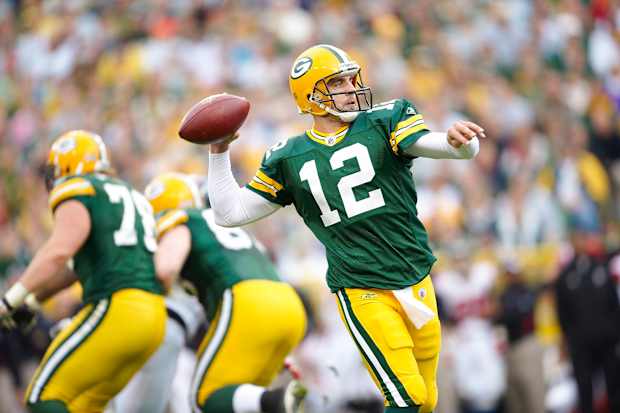
Heinz Kluetmeier/Sports Illustrated
Rodgers is a four-time MVP with a Super Bowl ring to his credit. He’s also been selected to 10 Pro Bowls and is a four-time first-team All-Pro, certainly earning the distinction of being one of the best in his era.
“One of the best passers I’ve ever seen,” Christl says. “Probably the best of throwing on the run. I think those were his best years, when he started rolling out, making more extemporaneous plays. You look back at so many of his best players, like the toss to [Jared] Cook against Dallas [in the 2017 playoffs]. He could do it running to his left. Outstanding passer.”
It’s impossible to say Rodgers hasn’t been a dominant, defining player of his era. The only problem for him is he’s 11–10 in the playoffs, with four losses at Lambeau Field. He’s also played at the same time as Tom Brady, so being the best of his contemporaries is impossible. Unlike the first player on the list.
1
Don Hutson, WR (1935–45)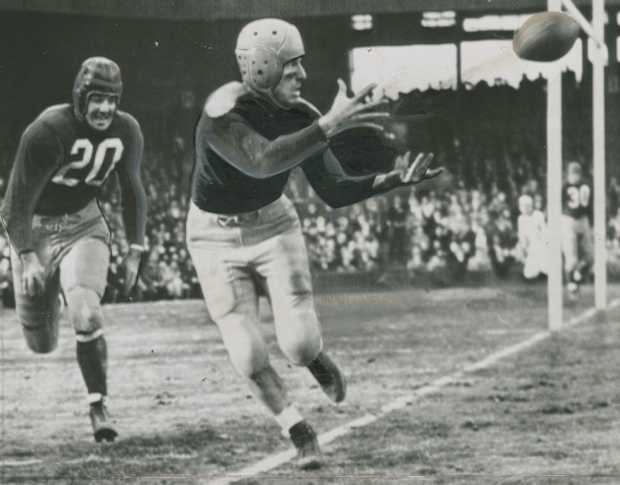
Milwaukee Journal Sentinel
Hutson revolutionized the receiver position. During an era when most teams threw the ball between 10 and 15 times per game, Hutson consistently racked up absurd receiving statistics for his era.
Over 11 seasons, Hutson caught 488 passes for 7,991 yards and 99 touchdowns. He led the league in receptions eight times, receiving yardage seven times and receiving touchdowns nine times. He was also twice granted the Joe F. Carr award, the precursor to the MVP.
“Do you realize how great this guy was?” said Bob Snyder, a six-year veteran of multiple positions with the Rams and Bears, to Christl in 1997. “He never was split from a damn tackle. He was a tight end. If they ever moved him outside, he would have made these guys today look silly. He had great speed, great hands, great change of pace.
“We always feared—[Curly] Lambeau never did it—that he’d split an end or put a guy in motion, so we couldn’t double-team Hutson. We practiced twice on Monday, twice on Tuesday, twice on Wednesday, twice on Thursday, twice on Friday. We had meetings every night. We called it ‘Green Bay Nut Week.’ All the guys bitched, but [coach George] Halas would just go crazy.”
In 1942, Hutson had an all-time season, catching 74 passes for 1,221 yards and 17 scores over 11 games, pacing the NFL in all categories.







